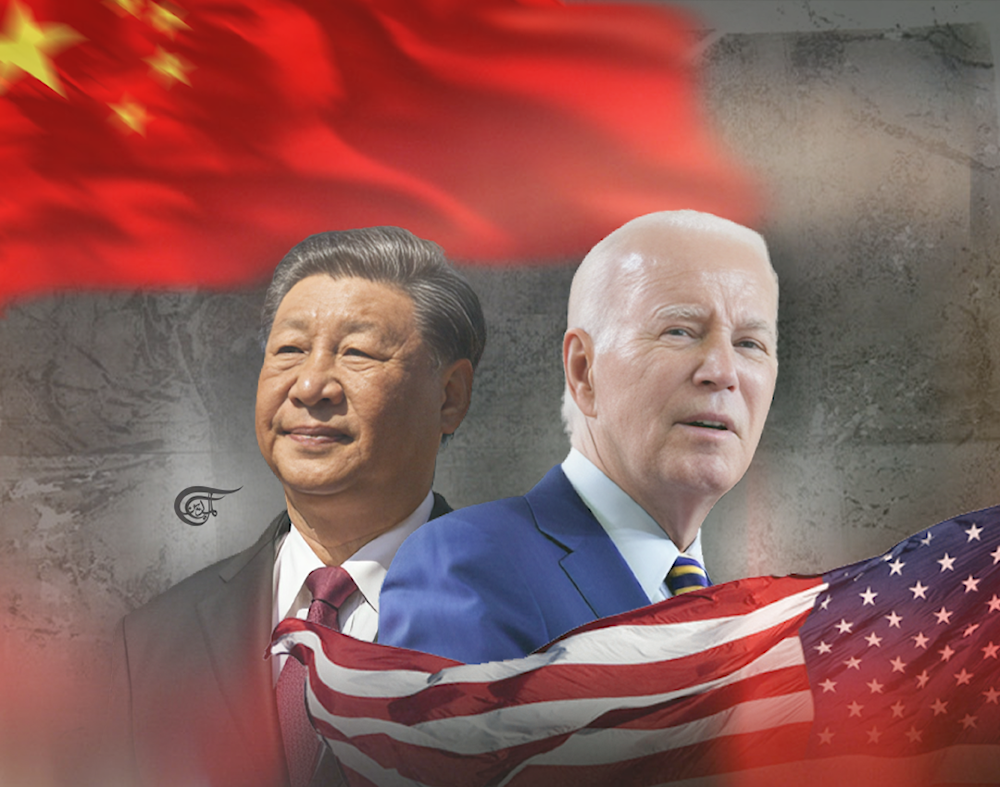To stabilize ties with China, US needs to honor Biden’s Bali promises
When it comes to international relations, making sure a country’s deeds match its words is also a matter of integrity.
-

(illustrated by: Zeinab El Hajj, Al Mayadeen English)
Restoring a degree of stability in the Beijing-Washington relationship is arguably a priority of the US foreign policy at the moment, and there are multiple reasons – domestic and international – why the US seeks to do so. A meeting between President Xi Jinping and President Joe Biden in San Francisco, built upon the two sides’ diplomatic engagement so far this year, is a great chance for the US to pursue this goal.
That being said, if the US repeats a past mistake of talking the talk without walking the walk, it will be difficult for a top leaders’ meeting to guarantee more signs of stability in bilateral ties. When the two leaders met in Indonesia’s Bali last year, Biden made an array of nice pledges to Xi, and their talks generated optimism about the relationship at the time. However, Washington is yet to convince Beijing with real actions that it is serious about those promises.
One thing Biden said in Bali is that the US respects China’s system, and does not seek to change it. It was once an unspoken US expectation that its trade and economic engagement with China would see the country evolve into a western-style democracy, but China’s development path has shown that its own system also works well in delivering economic prosperity. Therefore, it’s probably inevitable that the US comes to realize that attempts to change China’s system will be futile.
Development, equity, justice, democracy and freedom are the common aspirations of all peoples. Different countries have different approaches – including different political systems – to pursue these aspirations. In China’s mentality, such differences ought to be respected, which is why refraining from intervening in other countries’ internal affairs is a key principle in China’s foreign policy. In fact, Xi suggested to Biden in Bali that American-style democracy fits US conditions.
By comparison, the US is yet to put away its pride and prejudice, as US officials continue to endorse a narrative that frames so-called US-China competition as an ideological battle of “democracy versus authoritarianism”. During a US visit by Indian Prime Minister Narendra Modi in June, Biden said India, unlike China, shares a democratic character with the US. Such a narrative certainly has nothing to do with showing respect for China’s system.
Biden made it clear in Bali that the US does not seek a new Cold War, and does not seek to revitalize alliances against China. The reality, however, seems to be in stark contrast with Biden’s statement. The US has since moved to deepen a military alliance involving Japan and South Korea, with an August trilateral summit at Camp David partly taking aim at China. The US played a major role in the Philippines’ shift towards a confrontational approach to its South China Sea dispute with China. A September statement by the Pentagon said that US defense officials are encouraged by the way allies are increasingly acting together to counter China. From China’s perspective, these developments are precisely signs that the US is shoring up its Asia Pacific alliances to contain China.
On Taiwan, Biden made a pledge in Bali that the US does not support “Taiwan independence”, and does not support “two Chinas” or “one China, one Taiwan”. Although this year has not seen something as provocative as last summer’s visit to Taiwan by then-US House Speaker Nancy Pelosi, the US has continued with actions that in effect embolden Taiwan independence forces to pursue their agenda. Those moves include rushing to arm Taiwan, allowing Taiwan’s leader and deputy leader to make stopover visits to the US, signing a trade pact with Taiwan, etc. To China, they have raised a serious concern that the US is hollowing out the “one China” principle. In a bigger picture sense, a perception continues to exist that the US is using the Taiwan question as a card in a geopolitical game to counter China.
The Bali meeting also witnessed Biden claim that the US has no intention to seek de-coupling from China, or to halt China’s economic development. In this regard, there seem to be a mixed picture. The fact that this year’s China International Import Expo was participated by the first official US representation is of course a sign that some US government officials see China’s development as an opportunity. The setting up of bilateral economic and financial working groups also represents a step in the right direction. On the other hand, while complete de-coupling is impossible, technological de-coupling is certainly on the mind of the US government. Last month, the US unveiled new measures that seek to further restrict China’s access to advanced AI chips made by American firms. In contrast, days after the US ban was announced, China proposed a global AI governance initiative, calling for equal rights on AI development for all nations.
Both Chinese and American cultures attach importance to keeping one’s words. Ancient Chinese philosopher Confucius once said that “a man without credibility is capable of nothing”. And “undertake not what you cannot perform, but be careful to keep your promise” is a quote in a rules book that George Washington copied by hand and kept with him. When it comes to international relations, making sure a country’s deeds match its words is also a matter of integrity.
In a recent global online poll conducted by CGTN, some 86% of respondents believed that the key to maintaining the healthy and stable development of China-US relations is to implement the consensus reached by Xi and Biden in Bali. The US needs to do much more, or simply cease some of its existing practices, in order to convince China that it is genuinely seeking to stabilize bilateral relations.

 Ding Heng
Ding Heng
 6 Min Read
6 Min Read











